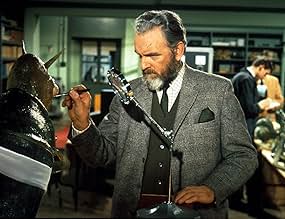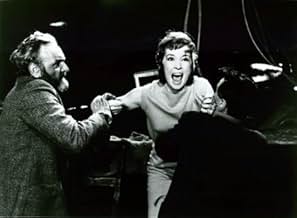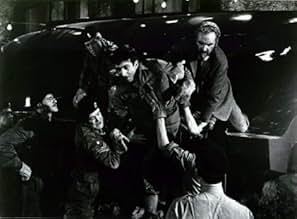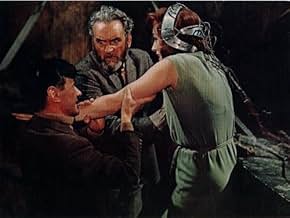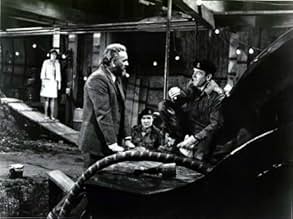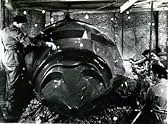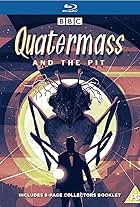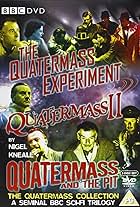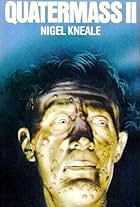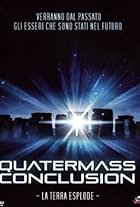A mysterious artifact is unearthed in London, and famous scientist Bernard Quatermass is called in to divine its origins and explain its strange effects on people.A mysterious artifact is unearthed in London, and famous scientist Bernard Quatermass is called in to divine its origins and explain its strange effects on people.A mysterious artifact is unearthed in London, and famous scientist Bernard Quatermass is called in to divine its origins and explain its strange effects on people.
Featured reviews
The movie is an outstanding adaptation from a TV serial exhibited in BBC (1958-59) written by Nigel Kneagle . As protagonist turns up Andrew Keir substituting to Brian Donlevy starring in ¨The Quatermass experiment¨ and ¨Quatermass II¨ , both of them directed by Val Guest , besides John Mills starred the final chapter titled the ¨Conclusion Quatermass¨ directed by Piers Haggard . This 1967 film is one of the greatest British science fiction films and the best of Quatermass trilogy . The great climax film is , of course , the final confrontation between the starring and the weird entity . In the picture appears the usual Hammer technicians and artistic team as cameraman Arthur Grant creating a riveting and colorful cinematography , Bernard Robinson making an awesome production design and ordinary musical conductor Philip Martell . The film is well produced by Anthony Nelson and magnificently directed by Roy Ward Baker . The flick will appeal to science fiction movie enthusiasts and Hammer fans . Rating : Above average and well worth watching .
Even today, despite the film's fair degree of dating, I am impressed and staggered by the conceptual genius of Nigel Kneale's script, and Roy Ward Baker's ability to mesh sci-fi and "Spiritual Evil" (as a disturbed Parson notes) in a product that is well removed from the standard Hammer fare. There is a real subversive pull to this little film, which piles on concepts such as Race Memory, Evolution, Conformity, Alien Colonization, Belief in "The Devil" and the occult, Ethnic Cleansing, Human Supremacy, and the arrogance, stupidity and mendacity of politicians and the military. On some level, it's hard not to be awed by the film's ambitions..
(****SOME PLOT SPOILERS BELOW****)
The plot: progress on The Hobb's End Underground Transport comes to a halt when the subway workers unearth what appear to be primitive apelike skeletons and a mysterious "craft" which is initially believed to be an unexploded bomb left over from The War. Professor Bernard Quatermass (Andrew Keir), at odds with the government over the planned military use of his "rocket group" investigates, with the assistance of two paleontologists, Dr. Mathew Roney (James Donald), and Dr. Barbara Judd (Barbara Shelley). Disturbed and intrigued that the skeletons were found IN the ship and appear to date nearly 5 millions years, and that the largely vacated Hobb's End Lane area has been a site for of "demoniac activity," for centuries.
Given the film's rather meager resources, it is hard not be impressed by the story, acting, and general mood of growing apocalyptic. In the usual Hammer film, the nemesis is clearly the supernatural: in these movies, we fear violent death at the hands of vampires, werewolves, ghouls, etc. The horror on hand in this movie, which doesn't show itself in all its preening glory until the end, is far more insidious and devastating. The Evil that threatens human civilization itself, questions our Evolution, Intellect, and Spiritual Beliefs. Because The Evil in Quatermass is, in essence, Dead from the get-go, it can't be easily faced, conquered, disputed with and laid to rest. The evil is, in fact, rooted firmly in the collective Mind of Man, and given the right "trigger", is able to manifest itself on a staggering, all-encompassing level. It shows itself in small clues: the scratches on the walls in the houses on Hobb's Lane, old local newspaper pieces and local history tomes, skulls, pentagrams on spaceship hulls, etc.: but when it finally does arrive, it upends Mankind's very identity, and the damage that is done, doesn't look like it can be repaired or explained away. Even when the "Pit's" alien ghosts are defeated, the victory seems pretty hollow.
Keir, whom I remember from such films as "Fall of The Roman Empire," and "Dracula Has Risen From The Grave", plays his role with gruff conviction ("I never had a career, I just had work!" He grouses to his unwanted colleague Colonel Breen), and I have always liked the amiable Donald, who was terrific as the most sane character in one of my favorite movies, "Bridge on The River Kwai.". The two are well-matched by the excellent Barbara Shelley, who brings a fair degree of wild sensuality to her role when she's possessed by an alien race memory. Still, I have to give some major plaudits to Glover, whose character is such a smug and supercilious ass, that it's fitting when you do see him kneel in lethal supplication to The Truth he has been dismissing throughout the movie. The occasional moments of dry as well as bumptious British humor are truly appreciated, offering occasional respite from the overall sense of rising darkness.
Many have pointed out that "Quatermass and The Pit", in its theme of alien intervention in human evolution is the dark flip-side to "2001," and that is certainly true. I also saw echoes of this film in Tobe Hooper's Lifeforce (1985), especially in the climactic scenes of London's devastation at the hands of its "space vampires.". You could also throw in Stephen King's novel, "The Tommyknockers". Even so, I was and still am, spellbound by the movie's novelty, its thought-intriguing meld of science-fiction and horror, the juxtaposition of skulls and sleek extraterrestrial metal, the Martian spaceship standing in quite nicely for the proverbial Haunted House. The movie does have its share of gaffes: the "alien locust" carcasses should have been seen as little as possible, and a scene where a soldier goes bonkers after seeing an "apparition of a small, hideous dwarf" inside the ship, lacks the timing to pull it off.
Still, given its execution and drive, the movie's coda of Keir and Shelley leaning wearily against the rubble of London as the city burns in the background, nicely sums up what horror films should be about: Things Are Not Okay, and may never be Okay anytime in the near future.
It seems like they were saving the best for last, and waited a whopping 10 years to deliver it. When skeletal remains are dug up during an extension to the London Underground, Palaeontologist Dr. Mathew Roney (James Donald) is called in, who concludes that the remains are that of an ancient race of 'apemen', possibly from 5 million years ago. Bernard Quatermass (Andrew Keir) disagrees however, and when further digging reveals a large metallic object, he believes it may be of alien origin. Colonel Breen (Game of Thrones' Julian Glover) insists that it is an unexploded bomb from World War II, and refutes Quatermass' claims. As the mystery unfolds, the discovery may lead to shocking revelations regarding man's evolution, and one that we are not ready to face.
Quatermass and the Pit may feature some incredibly dated effects, but this is sci-fi as complex and intellectual as 2001: A Space Odyssey (1968); a film it is often compared to. Based on the six- part series, Pit's main issue is the difficulty in condensing hours' worth of material into a 98-minute movie, hitting the audience with one theory and revelation after another. But great sci-fi is primarily built on a singular great idea, and this is up there with the best. While the twists and turns are often a struggle to keep up with, the frantic pace created by the lack of running time means that we're kept on the edge of our seats for the duration. Keir is also an improvement on American Brian Donlevy (who played the professor in the previous two films), infusing Quatermass with warmth and a distinct Britishness.
Storyline
Did you know
- TriviaThe original BBC serials were not shown on American television. As a result "Quatermass" was unknown to potential U.S. audiences. As was done with the previous two movie adaptations, the title was changed. Twentieth Century Fox released this in the United States as "Five Million Years to Earth" (1967).
- GoofsA minute or so before the end credits roll, as Quatermass is walking away from the devastation, a crew member's hand swings into the right-hand side of the frame and back out again.
- Quotes
Professor Bernard Quatermass: The will to survive... it's an odd phenomenon. Roney, if we found out earth was doomed - say, by climatic changes - what would we do about it?
Dr. Mathew Roney: Nothing. Just go on squabbling as usual.
Professor Bernard Quatermass: Yes, but if we weren't men?
- Alternate versionsThe 2011 UK DVD and Blu-ray release has some of the credits in the opening titles reworked to remove the "Associated Britsh-Pathe Limited presents" credit and accordingly the titles appearing from "A Hammer Film Production" to the title of the film appear in a different synchronized order and accordingly have been extended to appear longer on the print by a few seconds so that the title of the film still appears at the same music clash points as intended.
- ConnectionsFeatured in Aweful Movies with Deadly Earnest: Five Million Years to Earth (1972)
- How long is Quatermass and the Pit?Powered by Alexa
Details
Box office
- Budget
- £275,000 (estimated)
- Runtime1 hour 37 minutes
- Aspect ratio
- 1.66 : 1
Contribute to this page




